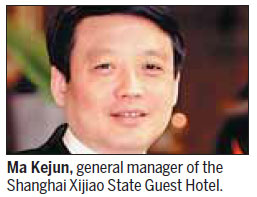Shanghai Xijiao State Guest Hotel: Secret gardens
|
A view of the hotel's guest residences and lawn. Photos Provided to China Daily |

There's more to Shanghai's preeminent State guest hotel than meets the eye, Zhu Yile and Matthew Fulco report.
A little green goes a long way, especially in a city perpetually blanketed in grey. The Shanghai Xijiao State Guest Hotel, long the top choice of Chinese and foreign leaders visiting the nation's commercial hub, sits on a luxuriant greenbelt that encompasses eight traditional Chinese gardens, a lake and enough trees to make the air quality splendid for Shanghai.
Set far back on a secluded 800,000-square meter sprawl, the hotel aims to provide a comfortable, secure setting for its guests, which since its founding in 1960 have included Queen Elizabeth II and US president Barack Obama.
Of particular attraction are its elegant Chinese gardens, including the Peony Garden, Ginkgo Garden, Rare Birds Garden and Osmanthus Garden. Foreign guests looking for a taste of the imperial China in their imaginations can find it here. With white swans gliding along canals and rare red-crowned cranes strutting along lush lawns, the scene evokes a pastoral Chinese bird-and-flower painting. It almost makes you forget there's a city of more than 20 million beyond the hotel's gates.
"Many of the birds live here naturally," says general manager Ma Kejun. Indeed, the fowl would be hard-pressed to find a more hospitable environment so close to Shanghai's downtown. The Shanghai Xijiao State Guest Hotel is situated within the Hongqiao Development Zone in what was once considered the city's fringes. With Shanghai's rapid development in recent years, it now sits ideally between the city center and western suburbs.
While the property has a celebrated history as a State guest hotel, with the policy changes implemented during China's economic reforms, it has moved in a market-oriented direction, according to Ma.
"It is imperative that in this transformation process, employees adopt innovative ideas, and not merely settle for what worked in the past," Ma says, adding that the hotel strives for the highest international-level standards.















